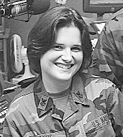Officer who gave 1010 WINS interview during marriage march faces Don’t Ask discharge
What was outrageous, to the military, was that Davis wore her uniform and talked about her partner, both publicly. Conspicuous even in a crowd of about 500, she was singled out by 1010 WINS AM radio for an interview. In a bold move, but one she self-deprecatingly described as “between stupid and dumb,” she identified herself and her employer, figuring “it’s AM radio, nobody listens to AM radio.”
COURTESY RHONDA DAVIS
Petty Officer 1st Class Rhonda Davis on duty at the Armed Forces Network in Tokyo.
Unfortunately, at least one of Davis’s co-workers must spend a lot time listening to AM radio. On the Monday following the rally she was called into her commander’s office and told she was being discharged for violating Don’t Ask, Don’t Tell.
Under Don’t Ask Don’t Tell, gays and lesbians are allowed to serve in the military as long as their sexual orientation is kept a secret. However, commanders are given great leeway in what evidence, actions, or statements can be considered “telling.”
“They can’t ask, but they can ask if you said you were gay, as they did in my case,” Davis said.
In an interview, Davis described life in the military as one of small hurts and evasions that left her angry and frustrated. She described being forced to carefully watch what she said to co-workers about her friends and what she did on the weekend and how she couldn’t talk about missing her girlfriend who has already had to return to Japan.
What truly broke her resolve to stay quiet was watching a male co-worker find and marry a Russian mail-order bride.
“Everyone thought it was great and here the best part of my life has to be invisible,” Davis said. “She is the only woman I have ever loved and I can’t say a thing about her.”
The double standard—that two heterosexuals who had never met each other could so easily dispose of the very same bureaucracy that has kept her apart from the woman she wants to marry—was too much for her.
“My girlfriend gave up a great job to come here,” Davis said, her Southern accent becoming sharp and angry. “Now she’s back in Japan living with her parents. This was suddenly important enough for me to risk everything.”
Her punishment is more than simple discharge. Davis has forfeited a career, lost retirement benefits, and must move out of her base housing when the discharge papers come through. To top it off, her military record will now list “homosexual conduct” as the reason for separation.
Yet, even her commander was reluctant to let her go. During the brief investigation he conducted into her statement, he told Davis that if she denied she was the person interviewed on the radio he would drop the matter.
Davis refused to lie.
“I am a proud, patriotic American who happens to be gay,” Davis said, in a written statement released by the Servicemembers Legal Defense Network, a group that represents military personnel affected by DADT. “My sexual orientation has never stood in the way of getting my job done, and I was looking forward to continuing my Navy career.”
Department of Defense statistics reveal that more than 11,000 American service members have been discharged for violating Don’t Ask, Don’t Tell since the ban’s inception during Clinton’s presidency. Annual discharges under DADT have fallen since the terrorist attacks on September 11, 2001, but last year showed a slight increase. According to the Government Accountability Office, more than 800 of those discharged under Don’t Ask, Don’t Tell were trained in skills deemed “mission-critical” by the Pentagon. A recent blue ribbon commission established by the University of California at Santa Barbara and its Center for the Study of Sexual Minorities in the Military estimated the cost of the ban at more than $363.8 million.
gaycitynews.com



































